Yucca Nutritional Information
Although originally little known in Spain, the Yucca It is a tuber widely consumed in countries such as America, Asia and Africa, where it is grown mainly from a tropical shrub.

It belongs to the family of Euforbiaceae, and one of the best known varieties is the one called sweet cassava, from which you get the well-known tapioca.
It presents a dark brown appearance, which sometimes tends to be brown, and its appearance is generally woody. Inside it houses a white meat that in many moments can remember the color of the white sweet potato.
Among its most important benefits we find that it is a tuber easy to digest, hence it is a recommended food in case of disorders, conditions and digestive problems (such as heartburn or gastritis nervosa). In addition, it is suitable for people with celiac disease, thanks to the fact that it is not a source of gluten.
Nutritional values of cassava
Although in the following lines we will deal with the own nutritional composition of cassava, the truth is that it is a tuber especially rich in complex carbohydrates, with an interesting satiating power.
100 grams of cassava provide:
- Calories: 120 kilocalories.
- Proteins: 3.1 grams.
- Carbohydrates: 26.8 grams.
- Fats: 0.4 grams.
- Vitamins: vitamin B6 (0.4 mg) and vitamin C (48.2 mg).
- Minerals: magnesium (66 g) and potassium (765 mg).
Image | CIAT International Center for Tropical Agriculture This article is published for informational purposes only. You can not and should not replace the consultation with a Nutritionist. We advise you to consult your trusted Nutritionist.


